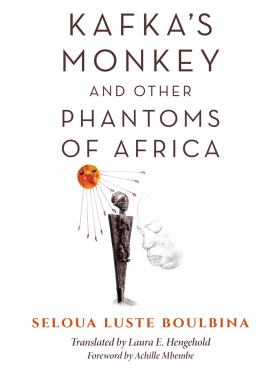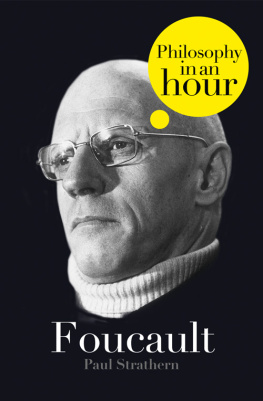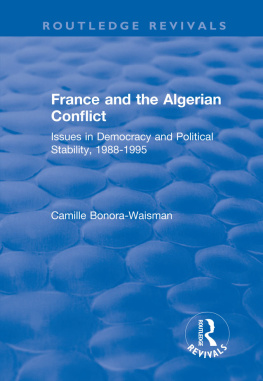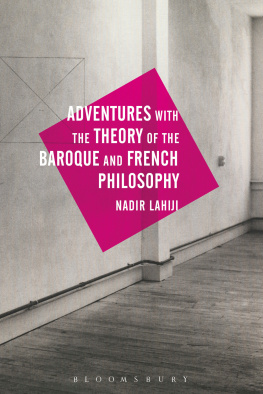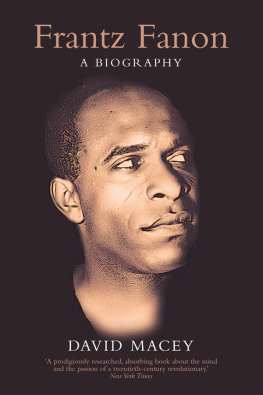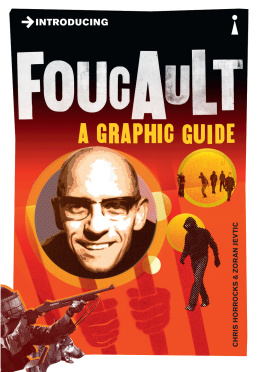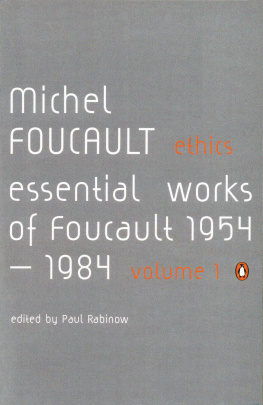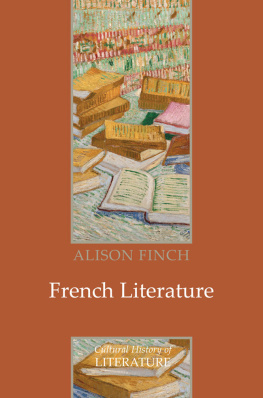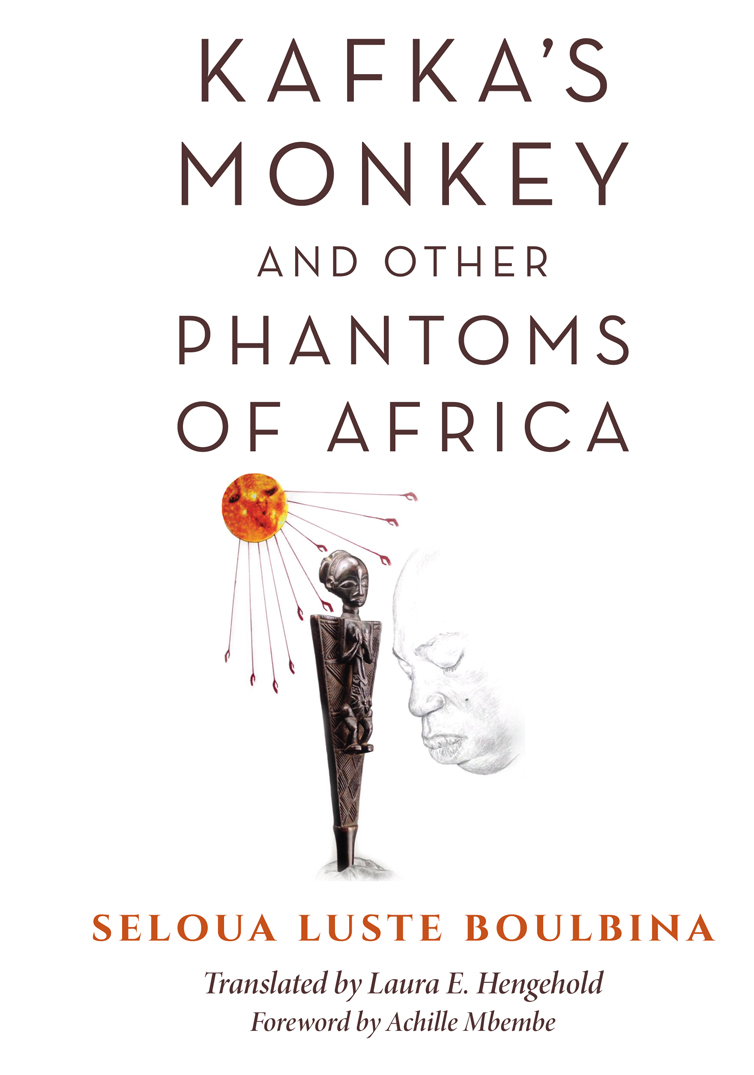Table of Contents
Guide
KAFKAS MONKEY AND OTHER PHANTOMS OF AFRICA
WORLD PHILOSOPHIES
Bret W. Davis, D. A. Masolo, and Alejandro Vallega, editors
This book is a publication of
Indiana University Press
Office of Scholarly Publishing
Herman B Wells Library 350
1320 East 10th Street
Bloomington, Indiana 47405 USA
iupress.indiana.edu
English translation 2019 by Indiana University Press
Originally published as Le singe de Kafka et autres propos sur la colonie by Editions Sens Public in 2008 and as LAfrique et ses fantmes: crire laprs by Prsence Africaine in 2015
This work received the French Voices Award for excellence in publication and translation. French Voices is a program created and funded by the French Embassy in the United States and FACE Foundation (French American Cultural Exchange).
All rights reserved
No part of this book may be reproduced or utilized in any form or by any means, electronic or mechanical, including photocopying and recording, or by any information storage and retrieval system, without permission in writing from the publisher. The paper used in this publication meets the minimum requirements of the American National Standard for Information SciencesPermanence of Paper for Printed Library Materials, ANSI Z39.48-1992.
Manufactured in the United States of America
Cataloging information is available from the Library of Congress.
ISBN 978-0-253-04191-3 (hardback)
ISBN 978-0-253-04192-0 (paperback)
ISBN 978-0-253-04195-1 (ebook)
1 2 3 4 5 24 23 22 21 20 19
Fatima, Khodja, Nadjib, et Marilys.
Amina, Krima, Myriam, lias,
Louis, Wellington, et Zouheir.
CONTENTS
I T SHOULD BE NOTED AT THE OUTSET THAT Seloua Luste Boulbinas rich intellectual trajectory is not only unique but thoroughly remarkable. A life trajectory mixing familial experience, conscious and unconscious choices, and chance and necessity imposes a rhythm and gives form and matter to a critical project that is without doubt one of the most fertile in the contemporary French intellectual landscape.
Here, we are witnesses to a perpetually wakeful spirit in a state of agility, one open to risk and to the unforeseen, which never stops springing forth and rebounding. This spirit carefully deciphers the multiple meanings of its encounters with all the fragments of a complex personal history, one inscribed at the interface of cultures and societies brought together by the accidents of time as well as the will and the actions of men. We must understand this initial historical situation, made of prohibitions, juxtapositions, and inversions, as the originating matrix of Seloua Luste Boulbinas theoretical project.
This is what explains her abundant productivity, no doubt the result of circumstances, but also the vivacious expression of an extraordinarily erudite and versatile mind, capable of diverse and singularly creative adaptations because it is endowed with an exceptional gift for identifying and going right to the heart of essential questions, the only ones truly worth the difficulty of being posed.
We would like to highlight above all Seloua Luste Boulbinas decisive contribution to the disentangling of the postcolonial question. Because at bottom, almost everything in her life and in her intellectual quest comes together and leads her to this central subject, which is still theorized far too infrequently and inadequately.
Around the world, the postcolonial turn in the social sciences and the humanities has been at work for almost a quarter century. During that time, the weight of its critique has been felt in many political, epistemological, institutional, and disciplinary debates in the United States, in Great Britain, and in several regions of the Southern Hemisphere (South America, South Africa, the Indian subcontinent, Australia, and New Zealand). Since its birth, this way of thinking has been the object of varied interpretations and has given rise, at more or less regular intervals, to waves of controversywhich continue elsewhereif not to totally contradictory objections.
Postcolonial critique has also given rise to quite divergent intellectual, political, and aesthetic practices, to the point that one is sometimes justified in wondering wherein lies its unity. Despite this fragmentation, we can affirm that at its core, the object of postcolonial critique is what one could call the interlacing of histories and the concatenation of worlds. Aided, among other things, by a more or less stubborn compartmentalization between the disciplines and between the forms of knowledge produced and disseminated in the Hexagon, France has long remained on the margin of these new voyages in planetary reflection. Such is no longer the case todayor so it seems, from the evidence of the many debates underway and the publication of numerous studies.
In France, meanwhile, the debate suffers from two weaknesses. On the one hand, privileging polemic, it is particularly preoccupied with the syntax and the politics of postcolonial studies, instead of doing postcolonial studies on the basis of empirical cases. On the other hand, this debate has quickly found itself in an epistemological cul-de-sac because it has imported conceptual tools that do not necessarily do justice to the singularity of the French imperial and colonial trajectories.
Africa and Its Phantoms constitutes Seloua Luste Boulbinas response to this double impasse. Her response is hardly a momentary or conjectural one. The ensemble of her work could actually be read as the search for this third place (to borrow a term from Derrida), a sort of desert within the desert since it refers neither simply to the archi-originary, nor simply to the unarchivable. In this sober and incisive text, history, language, and the colony are put in relation with architecture (interior), politics (internal), sexed space, and unveiled gender.
But what must we understand by postcolonial, and how should it be studied? It is a particular historical period, to be sure, but not just thata heritage from the past, certainly, but not only that either. Much more, it is a rationality that carries within it an imaginaryof what is yet to come. And it is here that Seloua Luste Boulbina distinguishes herself from a whole tradition of critique, which is as much Anglo-Saxon as it is Francophoneor should we say French?
She inscribes her theoretical and methodological effort in the logic of the old injunction to know oneself, which implies recognition of the subjects emergence as the experience of its irruption into speech and into language, passing through the ricochet of the voice. She admits, on the other hand, the centrality of practices of subjectivation inasmuch as they are always singularin other words, the work of actors situated in time, circumstances, and specific conditions that, for those concerned, make up an event. According this privilege to practice and to experience then permits her to approach colonial situations in their unique qualities and in the way that they become objects of symbolization.
More than a doctrine, what she proposes is therefore a strategy. This strategy gives a large place to indetermination, to instability, to hesitation, and to movement. But it also proposes that the postcolony is, before all else, an interworld, a relationship that is not just external and objective but also internal and subjective. These claims are realized through a taut and critical articulation of historiography, of psychoanalysis, of philosophy, and of literature.
Many other aspects of Seloua Luste Boulbinas work could be emphasized. One might draw attention to her decisive contribution to resolving the question of method in the apprehension of postcolonial reality, given that this is exactly the point on which the contemporary French debate runs aground. No less important, Seloua Luste Boulbinas works owe their impact beyond any immediate goal to the fact that they have enabled the renewal of critical theory in a singular confrontation with the multiplicity of languages and of discursive forms.
Next page
